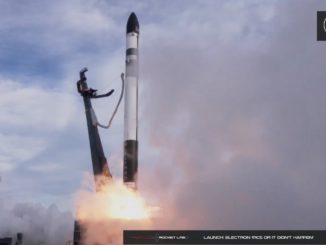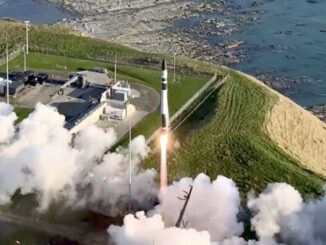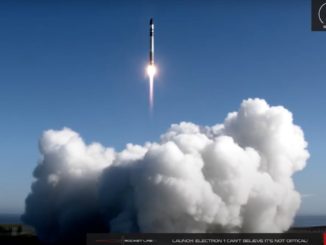
Rocket Lab was back in action on Wednesday, kicking off its launch year with a recovery Electron mission from New Zealand. This was its second return to flight mission following a mishap late last year.
Liftoff from Rocket Lab Launch Complex 1 in New Zealand occurred at 7:34 p.m. NZDT (1:34 a.m. EST, 0634 UTC). Poor weather scuttled launch opportunities originally set for mid-January.
On board the Electron rocket for the “Four of a Kind” mission were four Space Situational Awareness (SSA) satellites from Spire Global and NorthStar Earth & Space.
This was the 43rd launch overall for Rocket Lab to date and the latest mission to recover the first stage booster. About 17 minutes into the flight, the booster splashed down in Pacific Ocean under parachutes, where it was scooped up by a recovery vessel.
Rocket Lab has ambitions of re-flying a first stage booster in its entirety. Last August, it demonstrated partial reuse with the re-flight of a Rutherford engine.

“The success of today’s mission to deliver Spire & NorthStar to orbit, and the completion of our secondary mission to return Electron to Earth after launch, has been a fantastic start of what is set to be Rocket Lab’s busiest year ever,” said Rocket Lab CEO Peter Beck in a statement. “We have more missions booked in 2024 than we’ve ever scheduled before, and it is a real privilege to continue to deliver small launch reliability for our satellite customers on advanced missions like these and for all the missions to come in 2024.”
The four 16U Spire-built and operated satellites were deployed to a 530 km circular Earth orbit by German company, Exolaunch. The mission, dubbed “NorthStar-1” NorthStar Earth & Space, is the first batch out of a planned 24-satellite constellation, which the company claims as “the first-ever SSA-satellite-as-a-service constellation.”
“Starting with this initial flight, NorthStar will enable continuous monitoring of satellites and nearby objects, providing state vectors for early detection and warning of safety- and security-related phenomena,” the company said in a statement in December 2023.
“I am intensely proud of our NorthStar team on this landmark occasion,” said Stewart Bain, CEO and Founder of NorthStar in a statement. “This mission is the first of its kind and is the physical manifestation of a decade long dream to deliver hope to future generations of space enthusiasts and to all of us who every day depend on a sustainable and clean space environment for the wellbeing of our planet.”
NorthStar plans to launch the first 12 satellites by 2026.



